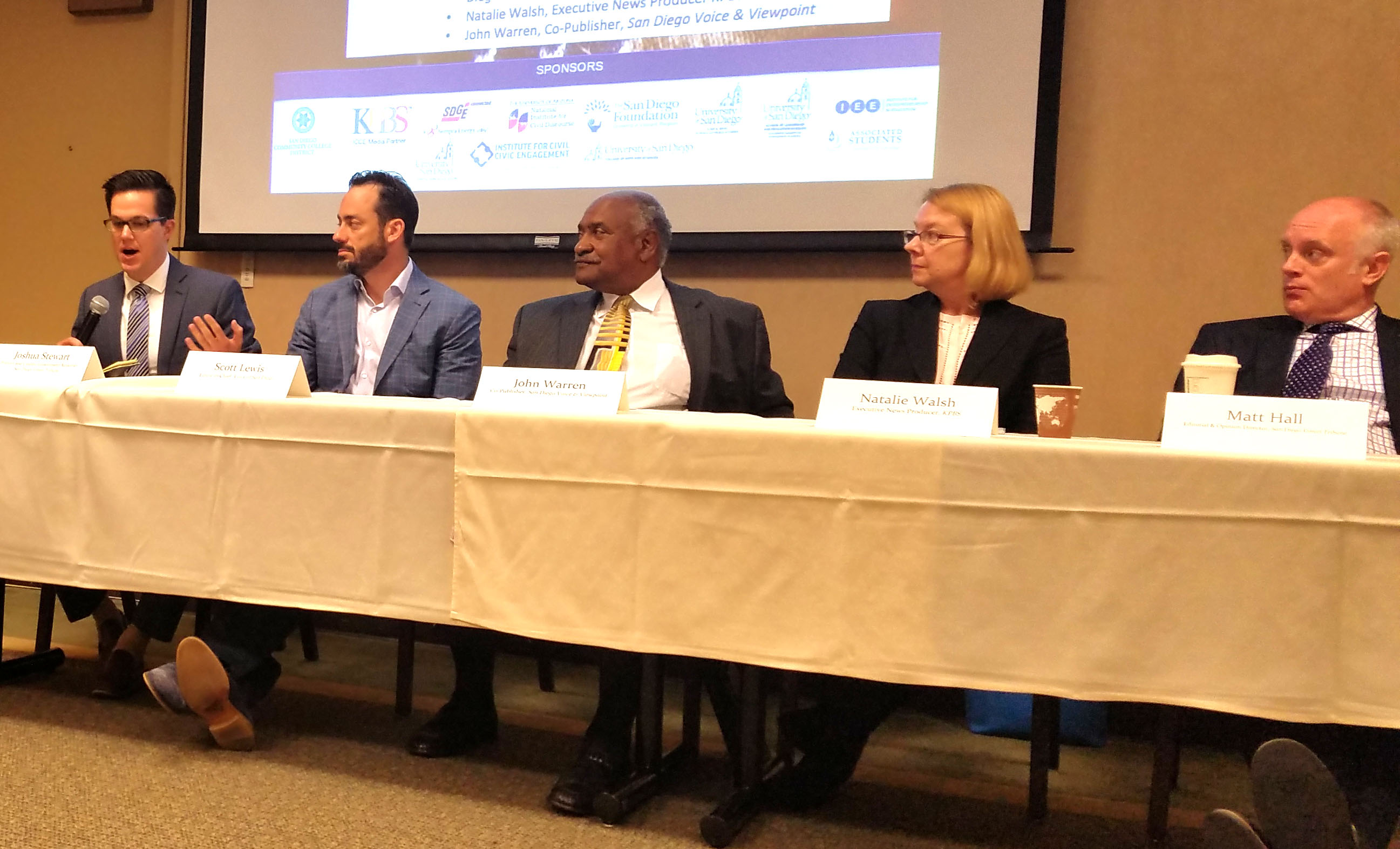Journalism Experts: “We’re Doomed”

Well, maybe.
The landscape of journalism today is covered with sensational headlines like the one above, despite the fact that there seems to be universal consensus in the power of these headlines to destroy civil dialogue.
In light of this, the National Institute of Civil Discourse hosted a panel Tuesday titled, ‘Media, Truth, and the Civility of Facts’ as part of their Sixth Annual Conference on Restoring Civility to Civic Dialogue. The panel featured local news editors and media professionals in a conversation about semantics, truth, and future of journalism.
Moderator Martha Barnette, co-host and co-producer of NPR’s ‘A Way With Words’, began by asking the panel’s thoughts on how the era of “post-truth” has affected their professions.
While most panelists immediately took to crying doom and gloom for journalism, Matt Hall, Editorial and Opinion Director of the San Diego Union Tribune, pointed out that despite being referred to as a post-truth era, there were more real-time fact checkers employed during the past election than in previous years.
A number of panelists highlighted how “real news” is often belittled by competition with “junk news,” and how the drive to create sensational headlines replaces slower, investigative journalism, and it often edges out local news.
Scott Lewis, Editor-in-Chief of Voice of San Diego, addressed the idea of “news deserts” - areas that receive suboptimal news coverage, such as local races and smaller community events that do not generate the same kind of hype or headlines.
Additionally, Lewis stated that local news faces the existential crisis of trying to decide what the purpose and authority of news is in the face of being constantly called the enemy by President Trump, as well as in the midst of the proliferation of “hoaxster” news agencies.
Joshua Stewart, Political and Government Country Reporter for the San Diego Union Tribune, said the purpose and authority of the press may not be able to compete with fake news and “hoaxsters.”
Stewart also pointed out that truthfulness is becoming less important to people than whether the information fits within their personal political narratives. The group also discussed at length the difficulty of telling news stories in a politically divided country, especially when the news cycle appears to be driven by unbridled emotions in place of a firm grasp on the facts.
Natalie Walsh, Executive New Producer of local PBS affiliate KPBS stated that her organization had to re-evaluate how to deliver news in a nation where the coasts are blue and the center is red.
From left to right: San Diego U-T Reporter Joshua Stewart, U-T Editor-in-Chief Scott Lewis, San Diego Voice & Viewpoint's John Warren, KPBS Executive News Producer Natalie Walsh, U-T Editorial and Opinion Director Matt Hall
Chad Peace, president of IVC Media, responded by highlighting that 40% of the country doesn’t identify with either major parties, which makes the red versus blue picture itself a false narrative.
The challenge of delivering the news to an utterly divided country is one for which these panelists didn’t appear to have a solid solution. The panel did say that individual and party perspectives are becoming more powerful than the press itself, and journalists and news media ought to pay more mind to their community and readership’s feedback.
Furthermore, since the market is so oversaturated with news (and fake news), it becomes more difficult to grab readers’ attention long enough to convey the complexity of a story. Instead, media are incentivized into hyperbole and exaggeration in order to get the eyeballs and clicks needed.
Then, Moderator Martha Barnette asked how the panelists cover statements that appear to be false. John Warren, Co-Publisher of the San Diego Voice & Viewpoint, stated that we needed to get back to “calling a lie a lie when it’s a lie.”
Warren’s statement sparked discussion into the danger of overusing the word “lie” in headlines, potentially deafening audiences to the seriousness of a lie, as well as the care that journalists must have in assigning intent to misinformation.
Lewis discussed the Voice of San Diego’s newly developed taxonomy, where they defined “true,” barely true,” “misleading,” “false,” and “hoaxster propaganda” - a term reserved for statements made with intentional disregard for the truth.
Peace pointed out that another type of dishonesty occurs when journalists hyperbolize politicians’ mistakes in order to rile up people into reposting and re-sharing their content on social media. Stewart agreed, stating that junk news has definitely altered the packaging and delivery of real news, as well as discouraged civil and reasonable discussions.
In a final discussion on whether news can be too civil, Warren told attendees, you can argue with what a person thinks but you can’t argue with what a person feels, again highlighting how readers’ emotions can drive news and political discussion. Peace added a reminder that civility doesn’t always equate to sincerity of facts.
When asked to end the session on a hopeful note, some reiterated the view that the landscape is bleak, while others found the glass half full, citing increased readership and people paying more attention to current events.
What do you think?
Photo Credit: panuwat phimpha / Shutterstock.com




